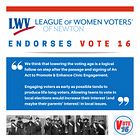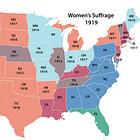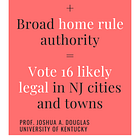What we have learned about extending the voting age to 16
We have learned so much about Vote 16 policy over the last 4 years. This post summarizes that learning in a simple and accessible way.
Since we started the Vote 16 Research Network in 2021, we have explored a number of questions of interest to researchers, activists, educators, and election officials who engage with Vote 16 policy. In recent months, we’ve seen incredible growth for the Vote 16 movement both in the United States and abroad. In the U.S. alone, the number of cities with Vote 16 policies has doubled since 2021 and the number of Americans living in cities with a Vote 16 policy has gone from less than 100,000 to nearly 1 million. With so many people getting involved with Vote 16 policy every day, we wanted to provide a summary of what we have learned and an open invitation to join this network. Please forward this email to people interested in Vote 16!
Here are the 5 top questions we have explored together since 2021!
1) What happens when Vote 16 has been implemented around the world?
In April 2022, Michael Shull published a comprehensive review of studies about Vote 16 policies around the world. You can read his full review of the literature here.
The upshot!
16-and 17-year-olds have the mental capacity to vote. Giving 16-and 17-year-olds the right to vote increases their likelihood of voting later in life. Public support for Vote 16 policies often starts low but rises after implementation.
Articles on this topic:
2) How do voters react to different messages about extending the voting age to 16?
The upshot!
Vote 16 support usually starts low. But opposition is soft. Our message tests show that voters respond positively to multiple kinds of messages encouraging support for Vote 16.
Articles on Vote 16 message tests:
3) What strategies are effective at building power for the Vote 16 movement in the United States?
The upshot!
Suffrage movements in the United States usually succeed by winning suffrage first at the local level. Successful American suffrage movements build the capacity to wage many simultaneous local campaigns within a national structure that can eventually push for a constitutional amendment. Polling data can provide important insights about where to campaign first. There are major opportunities to expand more quickly by partnering with existing grassroots networks like Common Cause, the League of Women Voters, and other peers advancing causes related to education, democracy, or youth rights.
Articles on Vote 16 power building!
4) What resources and advocacy are needed to ensure places implementing Vote 16 policy do it well?
The upshot!
Implementation is a significant but surmountable hurdle to Vote 16 policy. Vote 16 implementation is much harder in cities that use their state’s election management systems to administer local elections. We are working to overcome Vote 16 implementation challenges by providing detailed guidance to local election officials implementing Vote 16 and creating communities of practice and support for them to work together.
Articles on Vote 16 implementation:
5) Why is it legal for cities in some U.S. states to extend the voting age to 16 for school board and municipal elections?
The upshot!
State constitutions with home rule authority for municipalities and a positive right to vote (i.e. "everyone over 18 can vote" doesn't say anything about people under 18...) allow municipalities to adopt Vote 16 polices.
Articles about legal environment for Vote 16:
Help us keep growing together!
We are learning more about Vote 16 policy every day! In the U.S., ongoing implementation efforts in Berkeley, Oakland, and Newark are transforming our understanding of this issue. Globally, longitudinal data from Scotland, advocacy momentum in Canada and the U.K., a renewed push from the European Youth Parliament, and more are all advancing rapidly. This is such an exciting moment for the Vote 16 movement and we’d love to learn from you. Please share your questions with us, invite your friends and colleagues to join the network, and keep helping us learn together in the years to come!
Sam Novey is Chief Strategist at the University of Maryland Center for Democracy and Civic Engagement and founder of the Vote 16 Research Network.










